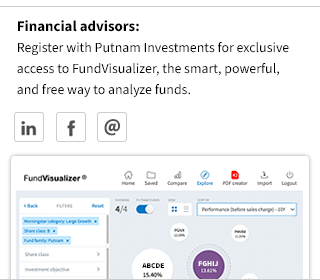The Putnam Multicultural Group (PMG) is one of five Business Impact Groups that are key cultural pillars at the firm, helping to build stronger relationships. In this edition of Active Voice, Cathy Saunders interviews the founders of the PMG, Jessica Ramirez and Sulochana Modur.
- Cathy Saunders, Head of Corporate Sustainability and Public Policy
- Jessica M. Ramirez, Senior Manager, Market Data Services
- Sulochana Modur, Senior Product Manager, Digital Technology
CS: Our Business Impact Groups (BIG) promote networking and engagement among hundreds of associates. Organized as part of our diversity and inclusion (D&I) efforts, the groups build a culture of inclusion and collaboration by focusing on awareness, education, community, professional development, and retention.
The Putnam Multicultural Group fosters respect and a celebration of the multiple cultures, ethnicities, and religions among our associates. Tell us how the group started.
SM: In 2019, Putnam was one of 10 corporations that participated in a Boston Chamber of Commerce diversity and inclusion initiative. It may sound naive, but this was the first time I had ever been exposed to D&I in the workplace. I was educated in India, working in tech and operations, and hadn’t really considered myself a “diverse” person. As part of the initiative, my group was asked to choose an “out group” and their needs. We chose women of color, and our research began with a series of interviews at the firm. Across the enterprise, we kept hearing the same wants and needs — to have more diverse representation in senior management and to be heard. This made me realize that I had never really had these types of conversations with many people at the firm. I approached Stephen Denny, Putnam’s Head of Human Resources, Diversity and Inclusion, asking what we might do to further the dialogue. He said that if I felt we should do something, I should pursue it. However, I was unsure about how to begin.
JR: At about the same time, I had been invited to a wedding in India. Sulochana kindly lent me a sari to wear for the occasion. We became friends as well as colleagues, and as we compared notes, we found we had something powerful in common. She was an immigrant to this country; I was a first-generation American. During a townhall, I asked the D&I leadership what Putnam was doing to further our D&I initiatives. I mentioned to Sulochana my question during the townhall, and we decided to join forces. We started the PMG by reaching out to other colleagues at Putnam. Everyone said yes, and we were in business.
CS: You launched the group in 2020 when everyone was in Covid lockdown. What was that like?
SM: We wanted to develop a community where we could feel we belonged, and where we could support each other. Putnam urged us to think in terms of business impact. But how could we deliver impact when we’re not even sure we belong? Our first step was to make sure we could build a community and create pillars to help set the framework.
JR: We reached out to other BIGs to get some direction. We got so much help, especially from Marketing as they helped us develop our beautiful logo. An early goal was to designate four pillars that define the impact we sought to create — belonging, community, outreach, and equity. And, of course, we wanted to make sure that everyone felt they could join the PMG. This applies to our Black, Hispanic, and Asian colleagues as well as among our allies who are not people of color.
CS: What I’m hearing is that you perceived a need and felt determined to respond as a group, with multiple colleagues supporting each other.
JR: Absolutely. Right off the bat, Aaron Cooper, Putnam’s Chief Operating Officer, reached out to us to say, “How can I help?” We want to have an impact, but often — as immigrants or first-generation Americans — we might fear pushing the envelope too much. We’re proud of our cultures, but sometimes hesitant to share with others.
SM: Once we got going, we had several colleagues tell us how much they valued their experiences with the PMG. I met so many colleagues from different backgrounds, working in different parts of the enterprise, who told me that they felt truly connected. They felt free to express their cultures and celebrate their heritage.
CS: So, while you would celebrate your culture within your own community, you might feel hesitant in the workplace.
JR: Exactly. I grew up in a very diverse community, so when I came from Florida to work in Boston, I realized that I had never been in an environment where I felt like a “minority.” But through our work at Putnam, we feel that this experience of sharing can be a positive thing — something to celebrate.
SM: Jessica and I have put a lot of effort into the PMG, and of course, this is all above and beyond our actual jobs. But our efforts have been broadly supported. This inspires us and helps us maintain momentum, especially when we hear from our diverse associates that this group makes them feel like they belong.
333880 5/23
More in:


